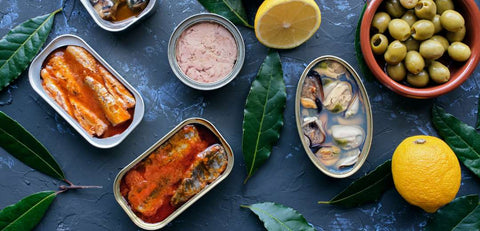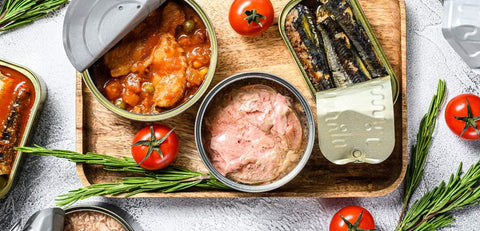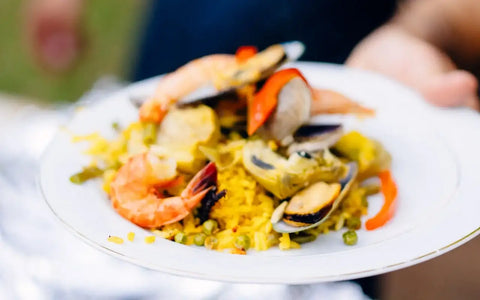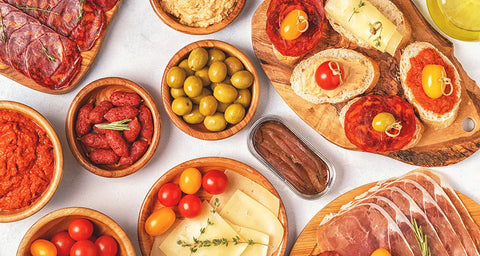The Spanish coast, kissed by both the Mediterranean Sea and the Atlantic Ocean, has blessed the nation with a rich bounty of seafood. This abundant catch spurred the ancient tradition of preservation, allowing Spaniards to enjoy the flavors of the sea year-round. With time, this art of preservation has been honed and refined, evolving from a survival necessity to a gourmet delight.
A Time-Honored Tradition
The history of Spanish canned seafood or 'conservas' finds its roots in the need to preserve the freshness of the catch for the off-season or longer voyages. Salting, pickling, and eventually canning in oils or sauces were techniques mastered by the Spanish to ensure they always had access to high-quality seafood, irrespective of the season.
Showcasing Regional Delights
Different regions of Spain brought their unique touch to conservas:
-
Anchovies from the Cantabrian Sea are a delicacy. Santoña, a town in Cantabria, transformed this simple fish into a gourmet treat with its intricate aging process. The Casa Santoña's Anchovies in Vinegar is a beautiful representation of this regional specialty.
-
Galicia, with its craggy coastlines, is famed for its octopus dishes. While 'pulpo a la gallega' is celebrated fresh, the preserved Octopus in Galician Sauce by Conservas de Cambados captures the region's flavors in a can.
-
The sun-kissed coasts of Andalucía are synonymous with sardines. While many enjoy them grilled on an 'espeto', others cherish the flavors of sardines preserved in tomato sauce, like Conservas de Cambados' version.
-
The Bay of Biscay treasures its white tuna or Bonito del Norte. Towns like Bermeo celebrate the tuna catch with festivals. The art of preserving this tuna in olive oil, as done by Yurrita, keeps the fish's essence alive throughout the year.
Galicia: Spain's Seafood Capital
Nestled in the northwest corner of Spain, Galicia holds the title as one of the nation's most prolific seafood regions. With its rugged coastline caressed by the Atlantic Ocean, Galicia has historically been the heartbeat of Spain's maritime and fishing activities.
-
Bountiful Waters: The cold and nutrient-rich waters of the Atlantic provide an ideal habitat for a myriad of marine species. From octopus and mussels to sardines and anchovies, the region's seafood variety is unmatched. It’s no wonder that many of the most revered seafood dishes in Spanish cuisine originate from this region.
-
Centuries-Old Traditions: Galicia's fishing traditions are deeply rooted and have been passed down through generations. The ancient "arte xávega" fishing technique, which involves casting a wide net from the shore and then pulling it in with the help of oxen or tractors, is still practiced in some parts of Galicia.
-
La Ría: These are intricate estuaries or inlets that snake into the land. Rich in biodiversity, the rías of Galicia are hotspots for shellfish farming, particularly mussels, oysters, and clams. The Rías Baixas, in particular, is known for producing some of the finest Albariño wines, which pair delightfully with seafood.
-
Seafood Festivals: Galicia is home to numerous seafood festivals or "fiestas" that celebrate its marine bounty. Perhaps the most famous is the "Fiesta del Pulpo" in Carballiño, dedicated to the octopus, a staple in Galician cuisine.
Modern Gourmet, Rooted in Tradition
Today, Spanish conservas have crossed national borders and grace gourmet shops and high-end restaurants globally. Yet, at their core, they remain a testament to Spain's maritime history, regional diversity, and culinary prowess.
In embracing a can of Spanish seafood, one isn't just savoring flavors but also partaking in a storied tradition that dates back centuries.
While canned seafood represents an age-old culinary tradition, modern practices in this industry have evolved to embrace principles of sustainability and ecological responsibility.
-
Sustainable Fishing Practices: Overfishing in our seas and oceans has necessitated the shift towards sustainable fishing methods. Spain, being one of the major producers of canned fish and seafood, has taken steps to ensure fishing is conducted responsibly. This encompasses respecting fishing seasons, employing techniques that reduce ecological impact, and establishing quotas to prevent over-exploitation.
-
Certifications: Numerous canned seafood companies in Spain now aim to acquire certifications affirming their sustainable practices. The Marine Stewardship Council (MSC) certification, for instance, doesn’t only validate responsible practices but also stands as a hallmark of quality and trust for environmentally-conscious consumers.
-
Waste Reduction: Packaging and production have also seen advances in terms of sustainability. From recyclable cans to production processes that minimize waste, the industry is making strides to reduce its ecological footprint.
-
Local Connection: While canned seafood has a global appeal, many brands have solidified their ties with local communities. This not only guarantees freshness and quality but also boosts local economies and reinforces the longstanding tradition of canning.
By choosing Spanish canned seafood, you're not only indulging in a top-tier product, but you're also supporting an industry that deeply values and respects both the environment and local traditions.





